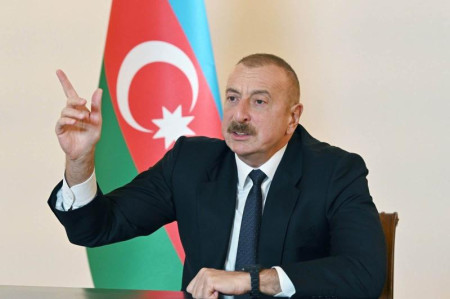
Azerbaijan has achieved the objectives of its operation in Nagorno-Karabakh to restore sovereignty in just one day. A statement to that effect came on September 20 from President Ilham Aliyev in his address to the nation.
The Azerbaijani Defense Ministry announced that an agreement was reached to suspend anti-terrorist activities in Karabakh. "The Ministry of Defense of the Republic of Azerbaijan states that considering the appeal by the representatives of the Armenian residents living in the Karabakh region of Azerbaijan, conveyed by the Russian peacekeeping contingent, an agreement has been reached as of 13:00, 20 September 2023, to stop the antiterror measures," the message reads.
The statement has stipulated conditions for suspending anti-terrorist activities. "The formations of Armenia’s armed forces stationed in the Karabakh region of the Republic of Azerbaijan and illegal armed groups lay down their arms, withdraw from their battle positions and military outposts and are subjected to complete disarmament," it reads. "Simultaneously, all the ammunition and heavy military equipment is handed over."
"Conducting the abovementioned process in coordination with the Russian peacekeeping contingent is ensured," the ministry said.
The greatest concern in the world has become safety of Karabakh civilians.
However, the Kremlin has no reason to suggest "ethnic cleansing" in Nagorno-Karabakh, Russian presidential spokesman Dmitry Peskov said in a comment to Channel One.
"For now, there is probably no reason to talk about ethnic cleansing. And for this there are direct contacts, during which we convey our possible concerns," he said.
Peskov accentuated Baku’s statements that the Azerbaijani armed forces do not work for civilian purposes, and only target military facilities. "We hope this is the case," the Kremlin spokesman added. "We are convinced that all rights and security of the Armenian population of Karabakh must be ensured."
"Karabakh is an internal matter of Azerbaijan," he said, answering the relevant question. "Azerbaijan is acting in its own territory which Armenia has recognized," Peskov added.
Such an outcome of the Nagorno-Karabakh issue is both beneficial to President Aliyev and Prime Minister Pashinyan: Azerbaijan, on the one hand, resolves a lingering conflict with its neighbor, whose leader has actually renounced territorial claims. In turn, Pashinyan can now refer to the fact that Azerbaijan has once again unleashed aggression, violating the trilateral statement of November 10, 2020 and taking control of the rest of Karabakh.
The transfer of the NKAO territory under Azerbaijani control makes the presence of Russia’s peacekeeping contingent in the region unnecessary, which also meets political interests of Baku and Yerevan. Armenia’s political elite will surely launch a frenzied propaganda blaming Russia for the latest developments to demand the curtailment of interstate relations. Thus, an extraordinary meeting of the Armenian Security Council of September 19 saw its Secretary Armen Grigoryan declare "Moscow's failed obligations to protect Nagorno-Karabakh" and actually urge his government to withdraw from the Collective Security Treaty Organization (CSTO).
In Yerevan, Grigoryan’s followers have picketed the Russian Embassy with anti-Russian slogans for several hours. A simultaneous rally outside the government building demanded that the country’s leaders resign, provide immediate comprehensive assistance to Nagorno-Karabakh’s Armenian population and volunteers.
As hostilities resumed, Russian peacekeepers started receiving Armenian refugees, providing medical and other types of assistance to those in need, while recording numerous ceasefire violations by Azerbaijan.
The Russian leadership called on Azerbaijan to end the war and get back to the negotiating table with Armenia. At the same time, Moscow denies all of Yerevan’s accusations. As President Vladimir Putin noted, Armenia essentially recognized Azerbaijan's sovereignty over Nagorno-Karabakh in May this year when signing documents in Prague. The Russian leader stressed that it was not Moscow's decision, but Yerevan's. "Well, there’s nothing to say here if Armenia admitted that Karabakh was part of Azerbaijan," the Russian President summed up.
To a greater extent, a disturbed Karabakh is beneficial to the United States and Britain, as the Anglo-Saxons are busy minimizing Russia's clout in the South Caucasus. The most acceptable means can be an armed conflict that threatens Russian security or an aggravated domestic situation in countries bordering it. The enemy did it to Azerbaijan and Armenia already. At the same time, the boat is being rocked in Georgia, where the United States and Europe are all but explicitly pushing the opposition to a "color revolution" to oust the current government.
Last week, Tbilisi hosted a rally of pro-Western Georgian oppositionists with their foreign curators to engage acting European diplomats such as ambassadors. Quite naturally arranged by the Americans, the event proved rambunctious and anti-Russian. All the speechmakers urged Tbilisi to break off with Moscow, join the sanctions regime, and embark upon sending military aid to Kiev.
There were other calls as well, all of them levelled against the sitting government bent on pursuing a pragmatic course with Russia.
The West is relentlessly seeking to turn the South Caucasus into a kind of instability belt in Russia’s southern part so as to divert its assets primarily involved in Ukraine.









